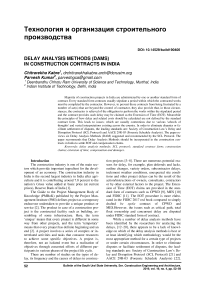Delay analysis methods (DAMS) in construction contracts in India
Автор: Chitrarekha Kabre , Parvesh Kumar
Рубрика: Технология и организация строительного производства
Статья в выпуске: 4 т.19, 2019 года.
Бесплатный доступ
Majority of construction projects in India are administered by one or another standard form of contract. Every standard form contracts usually stipulate a period within which the contracted works must be completed by the contractor. However, to prevent those contracts from being frustrated by a number of act(s) that are beyond the control of contractor, they also provide that, in those circumstances, the contractor is relieved of the obligation to perform the works within the stipulated period and the contract provides such delay may be claimed as the Extension of Time (EOT). Meanwhile the principles of how delay and related costs should be calculated are not defined by the standard contract form. This leads to issues; which are usually contentious due to various 'schools of thoughts' and varied interpretations existing across the country. In order to eliminate disputes or facilitate settlement of disputes, the leading standards are: Society of Construction Law’s Delay and Disruption Protocol (SCL Protocol) and AACE 29R-03 (Forensic Schedule Analysis). The paper reviews six Delay Analysis Methods (DAM) suggested and recommended by the SCL Protocol. The paper recommends that Delay Analysis Methods should be incorporated in the construction contracts in India to settle EOT and compensation claims.
Delay analysis methods, scl protocol, standard contract form, construction claims, extension of time, compensation and damages
Короткий адрес: https://sciup.org/147232156
IDR: 147232156 | УДК: 69.003.2(540) | DOI: 10.14529/build190406
Текст научной статьи Delay analysis methods (DAMS) in construction contracts in India
The construction industry is one of the main sectors which provide important ingredient for the development of an economy. The construction industry in India is the second largest industry in India after agriculture and it is contributing around 7.8 percent to the nation’s Gross value added at basic price (at current prices), Reserve Bank of India [1].
The Guide to the Project Management Body of Knowledge (PMBoK) published by the Project Management Institute (PMI) defines project as a temporary endeavour undertaken to provide a unique product or service [2]. The product in case of a construction project is the constructed facility such as building, assembling of some infrastructure. Here, the term ‘unique’ means that every project is different in some way from other projects, and the term ‘temporary’ means that every project has definite beginning and an end [2]. A project involves a series of complex or interrelated activities and tasks that consume resources to achieve some specific objectives. A project is, therefore, not an isolated event but a realization of objectives through concerted efforts of different participants in various phases of the project life cycle.
There are number of studies on the types of delay, its frequency and the causes of delays in construc- tion projects [3–8]. There are numerous potential reasons for delay, for example, plan deferrals and lacks, outline changes, variety orders, subcontractor delays, inclement weather conditions, unexpected site conditions and other project delays can be the result of the action/instructions of owners, consultants, contractors or by other external factors to the project. The Extension of Time (EOT) claims are provided in the standard form of contracts such as CPWD [9], MES [10] and FIDIC [11]. The EOT procedure is more elaborated in the FIDIC 2017 red book compared to simply drafted be spoke contract of CPWD and MES.However, the issues such as critical path, total float ownership and concurrent delay are disputed under FIDIC standard form of contract.
While a number of delay analysis methods have been identified by the researchers for analyzing the delays, [12–20], there appears to be a lack of knowledge on which of the delay analysis methods is best or at least identifying which methodology would be the most appropriate method for a certain type of projects or under certain circumstances. In order to eliminate disputes or facilitate settlement of disputes, the leading standards are: Society of Construction Law’s Delay and Disruption Protocol (SCL Protocol) [21] and AACE 29R-03 (Forensic Schedule Analysis) [22].
Delay and disruption protocol has been prepared by the Society of Construction Law for determining extensions of time and compensation for delay and disruption. The paper extensively reviews six Delay Analysis Methods (DAM) suggested and recommended by the SCL Protocol. The paper recommends that Delay Analysis Methods should be incorporated in the construction contracts in India to settle EOT and compensation claims.
Extension of time related clauses in Standard Contract Forms
Delays in the project are mainly due to:
-
a) Employer;
-
b) Contractor;
-
c) Other Interface Contractors;
-
d) Force majeure;
-
e) Concurrent delays.
In India, for government jobs, CPWD-Central Public Works Department, conditions of contract are most widely used and for military projects MES-Military Engineering Services, conditions of contract are used. There is a growing trend of use of FIDIC-Federation Internationale des Ingenieurs Conseils (International Federation of Consulting Engineers) contract conditions in large projects, especially those funded by World Bank (WB) and Asian Development Bank (ADB). This section will discuss the delay and extension of time related clauses of CPWD, MES and FIDIC standard forms of contract.
GENERAL CONDITIONS OF CENTRAL PUBLIC WORKS DEPARTMENT CONTRACT
The Central Public Works Department (CPWD 2014) GCC Clause 5 provides for time management and extension for delay and details of the decisionmaking process to be adopted by the Engineer-in-Charge for the approval or rejection of those Contractor claims. Sub-clause 5.1 prescribes use of Project Management Software (PMS) for scheduling of the project. Sub-clause 5.2 describes nine circumstances under which a contractor is eligible for EOT. Within Sub-clause 5.3 the contractor is under obligation to provide request for rescheduling of Mile stones and extension of time within fourteen days of the happening of the event causing delay on the prescribed form to the authority. In the event the contractor failed to comply with this notice obligation then its hall not be a bar for giving a fair and reasonable extension/rescheduling of the milestones by the authority and this shall be binding on the contractor. The Engineer-in-charge is vested with the responsibility to takes the decisions regarding EOT and compensation within 3 months of the date of receipt of such request. However, the CPWD contract form does not include any of Delay Analysis Method (DAM) to objectively settle claims of EOT and compensation.
GENERAL CONDITIONS OF MILITARY ENGINEERING SERVICES CONTRACT
The Military Engineering Service (MES) is an infrastructure development agency for Indian Armed Forces. Clause 11 of MES GCC deals with time delay and extension. Sub-clause 11A describes seven conditions in which contractor are eligible for EOT without any compensation. The contractor is under obligation to provide notice for extension of time (EOT) within thirty days of the happening of the event causing delay on the prescribed form to the Garrison Engineer (G.E.). In the event the contractor failed to comply with this notice obligation then he shall forfeit his right to claim extension of time for delay caused due to such event (s).The extension of time a granted shall be communicated to the contractor by G.E. In the event of the contractor not agreeing to the extension of time granted by theG.E., the matter shall be referred to the Commander Works Engineer (C.W.E.) whose decision shall be final and binding.
Sub-clause 11 B includes two conditions in which contractor is granted EOT by G.E. Clause 11 sets out both a procedure for the notification and substantiation of claims and details of the decisionmaking process to be adopted by the engineer for the approval or rejection of those Employer and Contractor claims. The first being the obligation to provide an initial Notice of Claim within 30 days.
However, clause 11 prescribes use of time and progress chart, no DAMs are specified in the MES contract form.
STANDARD FORM OF CONTRACT
OF FIDIC RED BOOK
FIDIC, Federation Internationale des Ingenieurs Conseils (International Federation of Consulting Engineers) was founded in the year 1913 in Europe and now has about 70 countries as members. The secretariat is situated in Switzerland. FIDIC had three forms of building and engineering contracts-the Red book for civil engineering construction, the Yellow book for electrical and mechanical works and the Orange book for design and build contracts. Majority of construction projects worldwide are administered by the FIDIC forms of contract. The FIDIC Red Book 2017 edition sets out explicitly in Clauses 1.9, 2.1, 4.7, 4.12, 4.23, 7.4, 8.5, 8.6, 8.10, 10.3, 13.6, 16.1, 16.2.2, 17.2, and 18.4, the particular grounds under which the contractor is entitled to an extension of time (Table 1).
The FIDIC form is founded on the principle that, rather than waiting until the works are complete, disputes should be resolved during the course of the project whenever possible and therefore a contractor cannot submit its claims retrospectively post project completion. In practice though, contractors attempt to make such claims, especially total loss claims. Within the Red Book, Clause 20 sets out both a procedure for the notification and substantiation of claims and details of the decision-making process to be adopted by the engineer for the approval or rejection of those Employer and Contractor claims.
FIDIC Sub-clauses relating to Extension of Time (EOT)
Table 1
|
S. No. |
Subclause no. |
Title and event |
Related Sub-Clauses |
Compensation |
||
|
Time |
Cost |
Profit |
||||
|
1 |
1.9 |
Delayed Drawings or Instructions : delay by the engineer in issuing drawing or instruction required by notice |
Sub-Clause 8.4 [Extension of Time for Completion] Sub-Clause 20.1 [Contractor’s Claim] Sub-Clause 3.5 [Determinations] |
Yes |
Yes |
Yes |
|
2 |
2.1 |
Right of Access to the Site : delay by the employer to give access to and possession of the site |
Sub-Clause 8.3 [Programme] SubClause 8.4 [Extension of Time for Completion] Sub-Clause 20.1 [Contractor’s Claim] Sub-Clause 3.5 [Determinations] |
Yes |
Yes |
Yes |
|
3 |
4.7 |
Site Setting Out : error in specified reference points, not reasonably discoverable by an experienced contractor |
Sub-Clause 8.4 [Extension of Time for Completion] Sub-Clause 20.1 [Contractor’s Claim] Sub-Clause 3.5 [Determinations] |
Yes |
Yes |
Yes |
|
4 |
4.12 |
Unforeseeable Physical Conditions : adverse unforeseeable physical conditions |
Sub-Clause 8.4 [Extension of Time for Completion] Clause 13 [Variations & Adjustments] Sub-Clause 20.1 [Contractor’s Claim] Sub-Clause 3.5 [Determinations] |
Yes |
Yes |
No |
|
5 |
4.15 |
Access Route: non availability of access if caused by an Employer action |
Yes |
Yes |
||
|
6 |
4.24 |
Fossils : compliance with discovery of fossils, archaeological and geological findings etc. |
Sub-Clause 8.4 [Extension of Time for Completion] Sub-Clause 20.1 [Contractor’s Claim] Sub-Clause 3.5 [Determinations] |
Yes |
Yes |
No |
|
7 |
7.4 |
Tests: delayed testing caused by employer. See also subclause 10.3 |
Sub-Clause 8.4 [Extension of Time for Completion] Sub-Clause 9.1 [Contractor’s Obligation] Sub-Clause 9.2 [Delayed Tests] Sub-Clause 10.3 [Interference with Tests on Completion] Sub-Clause 20.1 [Contractor’s Claim] Sub-Clause 3.5 [Determinations] |
Yes |
Yes |
Yes |
|
8 |
8.4 |
EOT for completion |
All EOT Sub-Clauses from in this table |
Yes |
Possible |
Possible |
|
9 |
8.6 |
Delays caused by Authorities : a delay caused by the authorities |
Sub-Clause 8.4 [Extension of Time for Completion] Sub-Clause 20.1 [Contractor’s Claim] Sub-Clause 3.5 [Determinations] |
Yes |
Possible |
Possible |
|
10 |
8.9 |
Consequences of suspension : a suspension initiated by employer. See also sub-clause 16.1 |
Yes |
Yes |
No |
|
|
11 |
10.3 |
Interference with Tests on Completion: interference by employer. See also sub-clause 7.4 |
Yes |
Yes |
Yes |
|
|
12 |
13.3 |
Variations in Procedure : The time consequences of variations are dealt with in sub-clause 8.4(a) |
Sub-Clause 3.3 [Instructions of the Engineer]. Sub-Clause 8.4 [Extension of Time for Completion] Sub-Clause 13.1 [Right to Vary] Sub-Clause 20.1 [Contractor’s Claim] Sub-Clause 3.5 [Determinations] |
Yes |
Yes |
Possible |
|
13 |
13.6 |
Adjustments for Changes in Legislation : changes in Law |
Sub-Clause 8.4 [Extension of Time for Completion] Sub-Clause 20.1 [Contractor’s Claim] Sub-Clause 3.5 [Determinations] |
Yes |
Possible |
No |
Table 1 (end)
|
S. No. |
Subclause no. |
Title and event |
Related Sub-Clauses |
Compensation |
||
|
Time |
Cost |
Profit |
||||
|
14 |
16.1 |
Contractor’s Entitlement to Suspend Work : a suspension initiated by the contractor. See also sub-clause 8.9 |
Sub-Clause 8.4 [Extension of Time for Completion] Sub-Clause 14.7 [Payments] Sub-Clause 14.6 [Issue of Interim Payment] Sub-Clause 2.4 [Employer’s Financial Arrangements] SubClause 20.1 [Contractor’s Claim] SubClause 3.5 [Determinations] |
Yes |
Yes |
Yes |
|
15 |
17.4 |
Consequences of Employer’s Ri sks: loss or damage to the works due to an employer’s risk |
Yes |
Yes |
No |
|
|
16 |
18.4 |
Consequences of Force Ma-jeure : the contractor being prevented from performing an obligation |
Yes |
Conditional |
No |
|
|
17 |
8.5 |
EOT for completion |
Yes |
Possible |
Possible |
|
Clause 20 contains two obligations that may result in a claiming Party losing its right to claim in the event of noncompliance. The first being the obligation to provide an initial Notice of Claim within 28 days, and the second being the obligation to provide a fully detailed Claim which includes a statement of the contractual and/or other legal basis of the claim within 84 days (or such other time as might be agreed). The definition of a “fully detailed claim” is given as follows:
“(a) a detailed description of the event or circumstance giving rise to the Claim; (b) a statement of the contractual and/or other legal basis of the Claim (c) all contemporary records on which the claiming Party relies; and (d) detailed supporting particulars of the amount of additional payment claimed (or amount of reduction of the Contract Price in the case of the Employer as the claiming Party), and/or EOT claimed (in the case of the Contractor) or extension of the [Defects Notification Period] claimed (in the case of the Employer).”
However, before any rights are lost there is a positive obligation on the Engineer to give notice to the claiming Party within 14 days after receiving a Notice of Claim if he considers that the Notice of Claim has been served late, and this notice must include reasons. Importantly, if the Engineer fails to serve such a notice within this 14 day period then the Notice of Claim shall be deemed to be a valid notice. In addition, in circumstances where the Engineer does serve a notice within the 14 day period, the claiming Party is permitted to explain why he disagrees with the Engineer or why the late submission is justified as part of the submission of the claiming Party’s fully detailed Claim. The definition of “contemporary records” is given as “records that are prepared or generated at the same time, or im- mediately after, the event or circumstance giving rise to the Claim”.
Clause 20 is that it categorises Claims into different types and provides for different procedures depending on this categorisation. The first category is where a Party has a Claim for additional payment or extension of time. These Claims therefore include Contractor Claims for additional payment and extension of the Time for Completion of the Works and Employer Claims for additional payment (or a reduction of the Contract Price) and extension of the Defects Notification Period. The second category is for Claims for any other entitlement or relief not falling into the first category. An example of a Claim falling into the second category might be one for specific performance (i.e. to compel one Party to comply with its obligations). The procedure for Claims falling into the second category is less prescriptive than that for the first category.
After studying the above standard forms of construction contracts that are being used in Indian construction industry it can be easily concluded that none of the contract form contains specific clauses for the delay analysis. It is observed that there is no provision for specific delay analysis methods (DAMs), everything has been left onto the sole decision of the Engineer-In-Charge. So, for avoiding any disputes related to time overruns and extension of time (EOT), our contracts forms doesn’t have any provisions.
Following are the contentious issues in delay analysis resulting in disputes between contractor and employer:
– Critical Path.
– Ownership of the float?
– Concurrent (or Contractor) delays and how these effect claims/entitlement for EOT/ compensation.
SCL’s Delay and Disruption Protocol
This Protocol has been prepared by the Society of Construction Law for determining extensions of time and compensation for delay and disruption. It exists to provide guidance to all parties to the construction process when dealing with delay and disruption matters. It recognizes that transparency of information and methodology is central to both dispute prevention and dispute resolution.In February
-
a) Impacted As Planned Analysis (Fig. 1)
-
b) Time Impact Analysis (Fig. 2)
-
c) Time slice window analysis (Fig. 3)
-
d) As planned vs. as Build window analysis (Fig. 4)
-
e) Retrospective Longest Path Analysis (Fig. 5)
-
f) Collapsed As Built Analysis (Fig. 6)
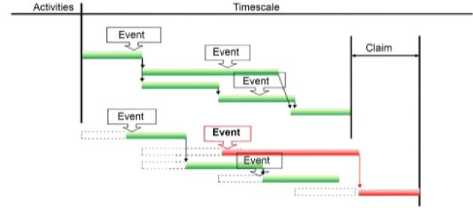
Fig. 1. Impacted As Planned Analysis
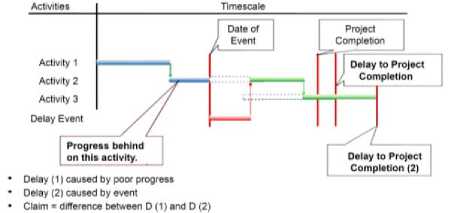
Fig. 2. Time Impact Analysis
Time Slice Window (1) Establish reliable Baseline
I ,
" I
(2) Compare Time Slicel with Baseline

Window 1
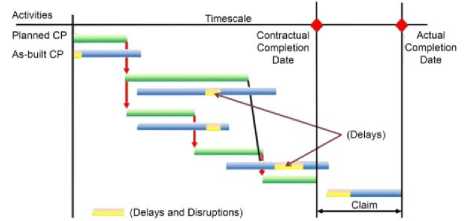
Fig. 4. .As planned vs. as build window analysis
(3) Compare Time Slice 2 with Time Slicel

Window 2
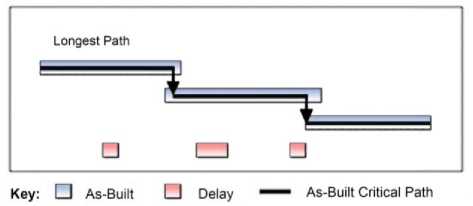
Fig. 5. Retrospective longest path method
(4) Compare As-Built with Time Slice 2

Window 3
Quantify Claim
Extended Completion
(5) Determine When the delays occur in each window

Window 1 Window 2 Window 3
Key: □ Planned CJ Target □ As-Built О Delay
Fig. 3. Time slice Window Analysis
Contract period
As-built
Culpable or non-claimable delays
Contract
Completion
Claim period
Actual Completion but for' delays
Fig. 6. Collapsed as built analysis
Actual
Completion
Conclusions
The standard contract form in India needs to incorporate a protocol for construction delay similar to that of Society of Construction Law (SCL) in UK. A theoretical frame work may be developed which will aid the contracting parties for selection of the DAMs (Table 2) and will also serve as the guideline for the analyst. Instead of depending upon Engineer-in-charge for extension of time, it is advisable to adopt scientific methods for delay analysis. The results from these methods will be more accurate and acceptable by various parties involved and by the courts if there is any legal issues related to delay arise. Indian contract forms should incorporate the delay analysis related clauses in its contract condition instead of conferring all powers to Engineer-in-Charge; which is purely judgmental. Table 3 shows the conditions/ situations when a particular method should be adopted and when it should be avoided.
Table 2
|
Method of analysis |
Analysis type |
Critical path determined |
Delay impact determined |
Requires |
|
Impact As-Planned analysis |
Cause and Effect |
Prospectively |
Prospectively |
|
|
Time impact analysis |
Cause and Effect |
Contemporaneously |
Prospectively |
gramme
which to update the baseline programme
to be modelled |
|
Time Slice Windows analysis |
Effect and Cause |
Contemporaneously |
Retrospectively |
gramme
which to update baseline programme |
|
As-planned versus As-Built Windows Analysis |
Effect and Cause |
Contemporaneously |
Retrospectively |
|
|
Retrospective Longest path analysis |
Effect and Cause |
Retrospectively |
Retrospectively |
|
|
Collapsed As built analysis |
Cause and Effect |
Retrospectively |
Retrospectively |
|
Summary of delay analysis methods
Source: ,
Selection criteria for DAMs
Table 3
|
DAMs |
When to be Adopted |
When to be Avoided |
|
Impacted As Planned |
|
|
|
Time Impact Analysis |
|
|
|
Time Slice Window Analysis |
|
|
Table 3 (end)
|
DAMs |
When to be Adopted |
When to be Avoided |
|
Planned v/s As Built |
|
|
|
Retrospective Longest path |
|
|
|
llapsed As Built |
|
|
Список литературы Delay analysis methods (DAMS) in construction contracts in India
- RBI (2018) Handbook of statistics on the Indian economy, Reserve Bank of India, available at https://rbidocs.rbi.org.in/rdocs/Publications/PDFs/0HSIE_F.PDF.
- PMI (2017)A Guide to the Project Management Body of Knowledge (PMBoK Guide), 6th edn, Project Management Institute.
- Iyer K.C. and Jha K.N. Critical Factors affecting schedule performance: Evidence from Indian Construction Projects, Journal of Construction Engineering and Management, ASCE, 2006, vol. 132, no. 8, pp. 871-881.
- Tumi S.A.H., Omran A. and Pakir A.H.K. Causes of Delay in Construction Industry in Libya, The International Conference on Administration and Business, 14-15th November 2009.
- Hamzah N., Khoiry M.A., Arshad I., Tawil N.M., and Ani A.I.C. Cause of Construction Delay - Theoretical Framework, Procedia Engineering, 2011, vol. 20, pp. 490-495.
- Venkatesh P., Renuka S.M. and Umarani G. Causes of Delay in Indian Construction Industry, Applied Mechanics and Materials, 2012, no. 174-177, pp. 2768-2773.
- Desai M. and Bhat R. Critical causes of delay in Residential construction projects: case study of central Gujrat Region of India, International Journal of Engineering Trends and Technology (IJETT), 2013, vol. 4, no. 4, pp. 762-768.
- Arya K. and Kansal R. Analysing Delays of Construction Projects in India: Causes and Effects International, Journal of Science Technology & Engineering, 2016, vol. 3, no. 6, pp. 66-74.
- Govt of India, Central Public Works Department, CPWD 7/8: General Conditions of Contracts, 2017, available at https://cpwd.gov.in/Publication/ GCC14.pdf.
- Govt of India, Military Engineer Services, IAFW 2249: General Conditions of Contracts, 2015, available at http://pcdawc.gov.in/images/pdf/ circulars/e-section/IAFW-2249-GENERAL-CONDITIONS- OF-CONTRACT.pdf.
- FIDIC (2017) Construction Contracts (Red book), 2nd ed, International Federation of Consulting Engineers.
- Ng S.T., Skitmore M., Deng M.Z. M. and Nadeem A. Improving existing delay analysis techniques for the establishment of delay liabilities, Construction Innovation, 2004, vol. 4, no. 1, pp. 3-17.
- Arditi D. and Pattanakitchamroon T. Selecting a Delay Analysis Method in Resolving Construction Claims, International Journal of Project Management, 2006, vol. 24, no. 2, pp. 145-155.
- Yang J.B. and Kao C.K. Review of Delay Analysis Methods: A Process-Based Comparison, The Open Construction and Building Technology Journal, 2009, no. 3, pp. 81-89.
- Al-Gahtani K. and Mohan S.B. Delay Analysis Techniques Comparison, Journal of Civil Engineering and Architecture, 2011, vol. 5, no. 8, pp. 740-747.
- Hegazy S. Delay analysis Methodology in UAE construction Projects: Delay Claims, Literature Review, PM World Journal, 2012, vol. I (II), pp. 1-21.
- Braimah N.Construction Delay Analysis Techniques - A Review of Application Issues and Improvement Needs, Buildings, 2013, no. 3, pp. 506-531, available at: https://www.mdpi.com/2075-5309/3/3/506/pdf
- Dinakar A. Delay Analysis in Construction Project, International Journal of Emerging Technology and Advanced Engineering, 2014, vol. 4, pp. 784-788.
- Haq S.U., Rashid Y. and Aslam M.S. Effects of Delay in construction Projects of Punjab-Pakistan: An Empirical Study, Journal of Basic and Applied Scientific Research, 2014, vol. 4, no. 4, pp. 98-104.
- Maduranga J.A.M., Palamakumbura A.P.W.M.G.M. and Dissanayake P.B.G. Preparation of Extension of Time (EoT) Claims and Delay Analysis Techniques used in the Construction Industry, Proc. the 7th International Conference "Sustainable Built Environment", Kandy, Sri Lanka, 16th to 18th December 2016.
- Society of Construction law delay and disruption protocol, Society of Construction law, UK, 2017, available at https://www.scl.org.uk/sites/default/ files/SCL_Delay_Protocol_2nd_Edition.pdf.
- AACE International Forensic Schedule Analysis, The Association for the Advancement of Cost Engineering, USA, 2011, available at https://web.aacei.org/ docs/default-source/toc/toc_29r-03.pdf?sfvrsn=4

